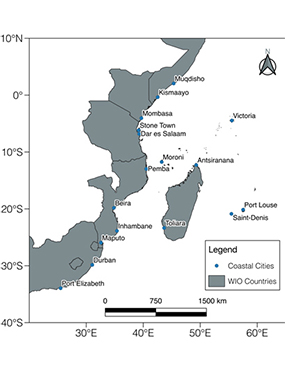Helping to prioritise marine conservation
We are researching and distributing policy-relevant science that is critical in helping to prioritise marine areas for biodiversity conservation and marine spatial planning in the Western Indian Ocean Region (WIO).
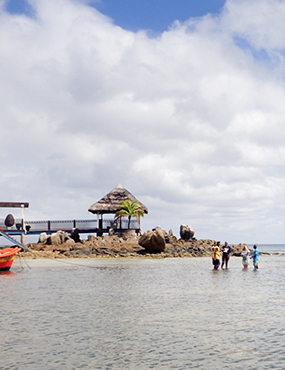
Supporting decisions on marine management
Macquarie University has been instrumental in supporting marine management efforts in the WIO through engagement activities with various institutional stakeholders.
Providing policy-relevant science involves translating scientific information on What was, What is, What could, What would and What should, with respect to sustainable use of marine and coastal social and ecological environment.
The engagement activities also include capacity building programs for marine management practitioners in the region designed to improve their skills in spatial analyses and data analyses and interpretation.
Macquarie University NSW 2109
Research associated with impact
In collaboration with our international research partners, we have been able to work on several recent projects with meaningful conservation impact, including plans to protect and recover coral reefs in the WIO region.
Macquarie’s engagement is improving the governance of marine areas beyond national jurisdiction, commonly referred to as the high seas. High seas are largely ungoverned and are therefore being impacted through destructive activities including mining, fishing and pollution. To address this, the UN is leading the international community in considering a range of approaches for sustainable management of the high seas.
As parts of these efforts, research on marine connectivity is being used to demonstrate to governments in the region that coastal areas are highly connected to the ungoverned high seas, and that activities in high seas can directly impact on coastal areas. The intended outcome is for governments to formulate laws that confer them greater influence over management of high seas resources to which they lie adjacent.
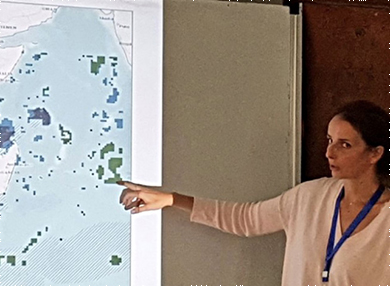
At a recent Conference of Parties (COP 9) of the UN Environment Nairobi Convention, relevant research was presented and discussed, consequently, a decision was arrived at by ten countries to adopt a resolution ‘to evaluate the feasibility, options and scenarios for the establishment of Marine Protected Areas in the high seas in the Western Indian Ocean region’ (UNEP/EAF/CP.9/5, 2018).
Following this resolution, efforts for designing marine spatial plans in the region are currently underway. A new postdoctoral candidate jointly funded by Macquarie and WIOMSA will lead the efforts on implementing the resolution on regional Marine Spatial Planning.
Macquarie’s engagement also assists the WIO countries attain global Sustainable Development Goals commitments, in particular Goal 14 on marine protected areas and sustainable use of coastal and marine areas. Under SDG14, countries committed to protecting ten percent of their marine and coastal areas, and to reducing pollution emanating from land.
Engagement occurred with UNEP and WIOMSA to help in the development of a spatial inventory to understand for each country how much area is currently under protection and how much more needs to be protected to meet the SDG14 commitments. These gap analyses have led to development and production of the WIO Outlook Report. In recognition of the continued engagement activities in the region, impact leaders were appointed to the Regional Task Force on River Flows.
The overall responsibility of the taskforce is to support the governments in the region in the effective implementation of activities aimed at reducing pollution emanating from land.
The WCS —Macquarie partnership aims to inform practitioners on strategic decisions on coral reef management. Over the last three years jointly with WCS, Macquarie coordinated dozens of scientists to develop a one-of-a-kind coral cover database in the Indo-Pacific. This database was used to conduct Big data analyses to identify key threats across multiple scales and strategic policy priorities that might sustain a network of functioning reefs in the Indo-Pacific to avoid ecosystem collapse.
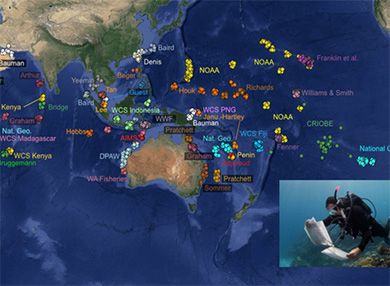
Published recently in the journal Nature Ecology and Evolution, the study involved the efforts of more than 80 authors who surveyed coral abundance on over 2500 reefs across 44 countries in the Indian and Pacific Oceans. The authors’ findings helped to formulate the three strategic choices of management for the reefs:
- Protect: 17 percent of coral reefs in the study’s dataset had functioning coral reefs and occurred in a climate ‘cool spot’ during the 2014-2017 El Niño. The reefs are found in 22 countries from East Africa to South East Asia, the Coral Triangle, and the Pacific. These findings call for an international network of coral reef conservation to save the world’s last functioning coral reefs.
- Recover: to promote rapid coral recovery where reefs (54 percent of those examined in the study) were previously functioning but have been recently impacted by the 2014-2017 coral bleaching event.
- Transform: to recognize that some coastal societies will need to transform away from dependence on reefs that are no longer functioning (28 percent of the reefs analysed fell into this category).
The study’s findings stress that strategic local management can play a role in helping protect corals through tools such as marine protected areas or other management restrictions that reduce threats and keep coral reefs above functional thresholds. However, the authors noted that local management can complement but not replace the need for worldwide efforts to limit carbon emissions.
The ongoing partnership with WCS is also supported through a jointly funded postdoctoral fellow based at Macquarie (Dr Stephanie D’agata) to support the WCS in incorporating relevant science into management decisions.
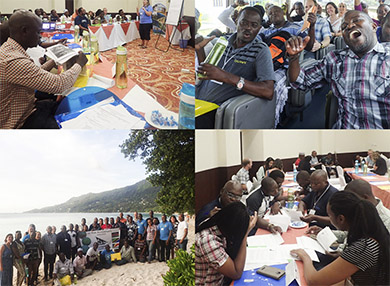 Capacity building initiatives in the WIO region, as part of partnerships with key institutional industry stake holders continues.
Capacity building initiatives in the WIO region, as part of partnerships with key institutional industry stake holders continues.
Recently in Seychelles, as part of The Nature Conservancy’s Smart Seas Africa program, Macquarie has led a training course to build skills of marine protected area (MPA) staff to become leaders in adaptive management by developing their communication and leadership skills and allowing them to become experts in one of three training areas: strategic management, data and graphing, and marine monitoring.
The training supports use of Strategic Adaptive Management (SAM), an approach co-developed with the Kenya Wildlife Service, Tanzania Marine Parks & Reserves Unit, and Seychelles National Parks Authority to move towards evidence based and adaptive MPA management that has been supported over the last 10 years by the SMART Seas Network for African MPAs.
Dr Maina Mbui
Macquarie University
Dr Stephanie D'agata
Macquarie University
- environmental agencies
- national research institutions
- civil society
- private sector.
- The United Nations Environment Programme (UNEP) Nairobi Convention.
- The Western Indian Ocean Marine Science Association (WIOMSA).
- The Wildlife Conservation Society (WCS).
- The Nature Conservancy.
The UNEP Nairobi Convention is a partnership working towards a prosperous WIO with healthy rivers, coasts and oceans. Because the convention provides a forum for intergovernmental discussions on regional marine management issues, it is a great platform for disseminating and mainstreaming policy relevant science. The partnership with UNEP and WIOMSA has provided an opportunity for directly engaging the governments through their representatives at the Conference of Parties on sustainable management of marine and coastal environment.
- Social-environmental drivers inform strategic management of coral reefs in the Anthropocene (2019) Nature Ecology and Evolution, in press: McClanahan TR, Maina JM, Gurney GA, Graham NAJ, Januchowski-Hartley F, Cinner JE, Mora C, Hicks CC, Maire E, Puotinen M, Skirving WJ, Adjeroud M, Ahmadia G, Arthur R, Bauman A, Beger M, Berumen M, Bigot L, Bouwmeester J, Brenier A, Bridge T, Brown E, Campbell S, Cannon S, Cauvin B, Chen C, Claudet J, Denis V, Donner S, Estradivari E, Fadli N, Feary D, Fenner D, Fox H, Franklin E, Friedlander A, Gilmour J, Goiran C, Guest J, Hobbs J, Hoey A, Houk P, Johnson S, Jupiter S, Kayal M, Kuo C, Lamb J, Lee M, Low J, Muthiga N, Muttaqin E, Nand Y, Nash K, Nedlic O, Pandolfi J, Pardede S, Patankar V, Penin L, Ribas-Deulofeu L, Richards Z, Roberts T, Rodgers K, Safuan C, Sala E, Shedrawi G, Sin T, Smallhorn-West P, Smith J, Sommer B, Steinberg P, Sutthacheep M, Tan C, Williams G, Wilson S, Yeemin T, Bruno JF, Fortin MJ, Krkosek M and D Mouillot. 2019.
- Temperature patterns and mechanisms influencing coral bleaching during the 2016 El Niño: Dr. Tim McClanahan, Dr. Emily Darling, Dr. Joseph Maina, Dr. Nyawira Muthiga, Dr. Stephanie D'agata, Dr. Stacy Jupiter, Dr. Rohan Arthur, Dr. Shaun Wilson, Dr. Sangeeta Mangubhai, Ms. Yashika Nand, Ali Usi, Dr. Austin Humphries, Dr. Vardhan Patankar, Dr. Mireille Guillaume, Dr. Sally Keith, Dr. George Shedrawi, Mr. Pagu Julius, Mr. Gabriel Grimsditch, Mr. January Ndagala, Mr. Julien Leblond (Accepted, Nature Climate Change).
- Joseph M Maina, Majambo Gamoyo, Vanessa Marie Adams, Stephanie D’agata, Jared Bosire, Julius Francis, Dixon Waruinge (2nd review) Aligning Marine Spatial Conservation Priorities with Functional Connectivity Across Maritime Jurisdictions, Conservation Science and Practice.
Countries where impact occurred
Includes: Comoros, Seychelles, Mauritius, Réunion (France), and global coral reefs.
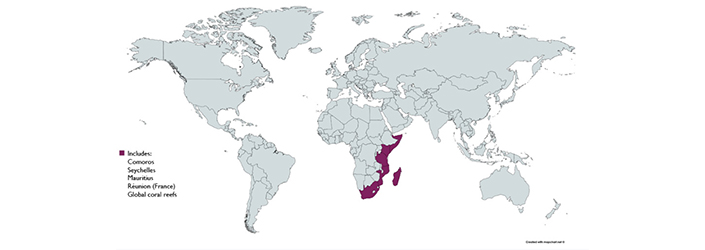
WIO countries including: Somalia, Kenya, Tanzania, Mozambique, South Africa, and Madagascar.
